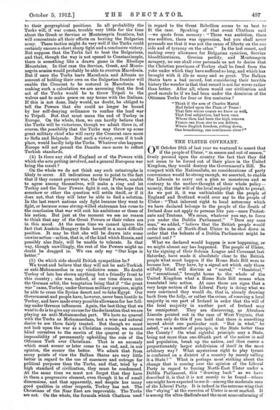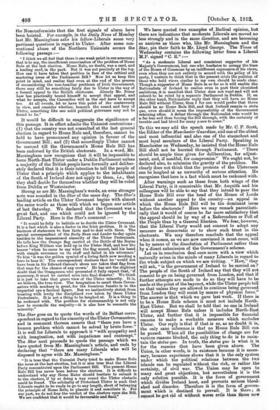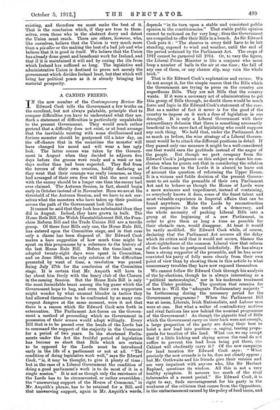THE ULSTER COVENANT.
ON October 28th of last year we ventured to assert that if the people of Ulster, " in season and out of season," firmly pressed upon the country the fact that they did not mean to be forced out of their place in the United Kingdom, they would destroy the Government's Bill. No compact with the Nationalists, no considerations of party convenience would be strong enough, we asserted, to enable the Liberals to carry out a plan so monstrous and so contrary to the mother-thought of their whole policy— namely, that the will of the local majority ought to prevail. As we put it, it was unthinkable that the people of England and Scotland would ever say to the people of Ulster : "That inherent right to local autonomy which we have declared belongs to the people of the South of Ireland does not apply to persons like you—mere Protest- ants and Teutons. We mean, whatever you say, to force you under the Dublin Parliament." " Does any sane man," we added, " believe that the British people would order the men of North-East Ulster to be shot down in order that the behests of a Dublin Parliament might be carried out ? "
What we declared would happen is now happening, or we might almost say has happened. The people of Ulster, by the signing of their Solemn League and Covenant last Saturday, have made it absolutely clear to the British people what must happen if the Home Rule Bill were to become law. They have, by a signal act which only those wilfully blind will discuss as " unreal," " theatrical," or " sensational," brought home to the whole of the United Kingdom what a Home Rule Bill means when translated into action. At once there are signs that a very large section of the Liberal Party is doing what we were convinced they would do, that is, already drawing back from the folly, or rather the crime, of coercing a local majority in one part of Ireland in order that the will of the local majority in another part of Ireland may be omnipotent. They are discovering, as Abraham Lincoln pointed out in the case of West Virginia, that you can only do this if you hold that there is something sacred about one particular unit. " But in what," he asked, " as a, matter of principle, is the State better than the County ? On what rightful principle may a State, being not more than one-fiftieth part of the nation in soil and population, break up the nation, and then coerce a proportionately larger subdivision of itself in the most arbitrary way ? What mysterious right to play tyrant is conferred on a district of a country by merely calling it a State ? " What is perhaps most striking about the change that is coming over the opinion of the Liberal Party in regard to forcing North-East Ulster under a Dublin Parliament, this "drawing back" as we have described it, is that it is not merely to be found—where one might have expected to see it—among the moderate men of the Liberal Party. It is indeed in the extreme wing that the " shying " at the coercion of Ulster is most marked. It is among the ultra-Radicals and the nioSt nonconforming of ' the Nonconformists that the first signals of alarm have been hoisted. For example, in the Daily News of Monday last Mr. Massingham asks his fellow-Liberals some very pertinent questions in regard to Ulster. After some con- ventional abuse of the Northern Unionists occurs the following passage :— "I think we all feel that there is one weak point in our armoury ; that is to say, the insufficient examination of the problem of Home Rule at the last election. Home Rule, no doubt, was a card, and a leading card, in the pack. Bat it was not precisely at the top. How can it have taken that position in face of the critical and mastering issue of the Parliament Bill ? Now let us keep this point in mind, and realize that even at the end of the process of reconsidering the non-familiar problems of Irish Government, there may still be something fairly due to Ulster in the way of a formal appeal to the British electorate. Already Mr. Bonar Law has practically bound himself to accept that appeal, and what be accepts, tho Carsonites will in the end have to accept too. At all events, let us have this point of the controversy in view, and consider whether, beneath the sound and fury of Ulster, something like one solid political grievance may not be found to lie."
It would be difficult to exaggerate the significance of this passage. It in effect admits the Unionist contentions : (1) that the country was not consulted at the last general election in regard to Home Rule and, therefore, cannot be held to have pronounced any opinion in favour of the Government Bill ; and (2) that accordingly Ulster cannot be coerced till the Government's Home Rule Bill has been endorsed by the British electorate. In a word, Mr. Massingham now recognizes that it will be impossible to force North-East Ulster under a Dublin Parliament unless a majority of the British people have formally and deliber- ately declared that it is their intention to tell the people of Ulster that a principle which applies to the inhabitants of the South of Ireland does not apply to them, i.e., that they shall decide for themselves whether they will beruled from Dublin or Westminster.
Strong as are Mr. Massingham's words, an even stronger note was sounded in the Star of the same day. The Star's leading article on the Ulster Covenant begins with almost the same words as those with which we began our article of last Saturday. We declared that the Covenant was a great fact, and one which could not be ignored by the Liberal Party. Here is the Star's comment :— " It would be folly to belittle or to deride the Ulster Covenant. It is a fact which is also a factor in the Irish problem. It is the business of statesmen to face facts and to deal with them. The special correspondent of the Daily News and Leader to-day again testifies to the impassioned sincerity of the Ulster Protestants. He tells how the Orange flag carried at the Battle of the Boyne before King William was held up in the Ulster Hall, and how the bearer • when he came to say what the flag meant, laid his hand with simple reverence an its staff and failed in his utterance.' To him *it was the golden symbol of a living faith now needing a hero to bear it.' The correspondent declares that he • would not have been in Sir Edward. Carson's shoes nor taken that flag from that man for the chance of any crown! He has not the slightest doubt that the Orangemen who presented it fully expect that, 'if necessary; it must be carried even into final disaster.' We think it is just to take that grave view of the Ulster minority. It is, we believe, the true view. The temptation to assail these Coven- anters with mockery is great, for the ferocious fanatic is to the impartial eye a farcical figure. But we instinctively shrink from treating with levity the disciplined vow taken by these Ulster Protestants. It is not a thing to be laughed at. It is a thing to be reckoned with. The problem for statesmanship is not only how to reconcile the majority—it is also bow to reconcile the minority."
The Star goes on to quote the words of its Belfast corre- spondent in regard to the sincerity of the Ulster Covenanters, and in comment thereon asserts that "there you have a human problem which cannot be solved by brute force." It is well for Liberals to approach it " with sympathy and with imagination, not with impatience and contempt." The Star next proceeds to quote the passage which we have quoted from Mr. Massingham's article, and ends by declaring that " there are many Liberals who will be disposed to agree with Mr. Massingham."
" It is true that the Unionist Party tried to make Home Rule the issue at the last election, but it is also true that the Liberal Party concentrated upon the Parliament Bill. The present Home Rule Bill has never been before the electors. It is difficult to understand why any Home Ruler should hesitate to submit it to the electors, if by so doing a way round the Ulster obstacle could be found. The solidarity of Protestant Ulster is such that Liberals ought to be ready to go to any length, short of betraying the principle of Home Rule, to placate it and ooncili.ste it. For our part, we do not fear the verdict of the electors upon the Bill. We are confident that it would be favourable and finaL" We have quoted two examples of Radical opinion, but there are indications that moderate Liberals are moved no less strongly and in the same direction, and are becoming as anxious as those who, like Mr. Massingham and the Star, pin their faith to Mr. Lloyd George. The Times of Wednesday contains the following letter from a Liberal M.P. signed " C. R" " As a moderate Liberal and consistent supporter of his Majesty's Government, but one who hesitates to occupy the time of the House of Commons by an indifferent expression of his views, even when they are not entirely in accord with the policy of his party, I venture to think that in the present crisis the position of those who hold views similar to my own should be made clear. Though a supporter of Home Rule in so far as it will enable the Nationalists of Ireland to realize even in part their cherished ambitions, it is manifest that Ulster does not want and will not submit to be ruled by a separate Parliament in Dublin. If, on the other hand, Nationalists reply that they will have no Home Rule Bill without Ulster, then I for one would prefer that there should be no Home Rule Bill, and that Ireland remain in statu quo, even should it mean the impossibility of the Government retaining office. A defeat through the Nationalist vote would be a far less evil than forcing the Bill through, with the certainty of trouble and bad blood for many yaars to come."
To this we may add the speech made by Mr. C. P. Scott, the Editor of the Manchester Guardian, and one of the ablest and most influential and also one of the staunchest and most loyal members of the Liberal Party. Speaking in Manchester on Wednesday, he insisted that the Home Rule Bill shall not be hurried through Parliament. " There should be ample time given for deliberation, for adjust- ment, and, if needful, for compromise." We ought not, he declared also, to minimize the gravity of the problem. He clearly does not think that the protests of the Ulstermen can be laughed at as unworthy of serious attention. He recognizes that here is a fact which must be reckoned with.
After warnings such as these from both wings of the Liberal Party, is it conceivable that Mr. Asquith and his colleagues will be able to say that they intend to pass the Home Rule Bill over the head of the House of Lords without another appeal to the country—an appeal in which the Home Rule Bill will be the dominant issue before the electorate ? Here we may remark parentheti- cally that it would of course be far more satisfactory that the appeal should be by way of a Referendum or Poll of the People than by a General Election. We fear, however, that the Liberal Party would not consent to adopt any measure so democratic or to show such trust in the electorate. We may therefore conclude that the appeal when it comes, as we are now convinced it must come, will be by means of the dissolution of Parliament rather than by a direct submission of the Government's scheme. Let us in conclusion deal once more with a view which naturally arises in the minds of many Liberals in regard to the whole subject on which we are writing. " How, they will ask, " is the government of Ireland to be carried on ? The people of the South of Ireland say that they will not consent to go on being governed from London, and that if further attempts are made to do so they will have to be made at the point of the bayonet, while the Ulster people tell us that unless they are allowed to continue being governed from London they will resist by means of physical force." The answer is that which we gave last week. If there is to be a Home Rule scheme it must not include North- East Ulster. But we shall be told that no one in Ireland will accept Home Rule unless it includes North-East Ulster, and further that it is impossible for financial reasons to make a workable measure which excludes Ulster. Our reply is that if that is so, as no doubt it is, the only sane inference is that no Home Rule Bill can be passed. When all the possibilities of change are for various reasons blocked, the only thing to do is to main- tain the status quo. In truth, the status quo is what it is for the reasons that have been given above. The Union, in other words, is in existence because it is neces- sary, because experience shows that it is the only system under which the political relations between the two islands can be regulated without the risk, or rather the certainty, of civil war. The Union may be open to many and great objections, but nevertheless it is the only solution possible. It is the form of government which divides Ireland least, and prevents serious blood- shed and disorder. Therefore it is the, form of govern- ment which is destined to prevail. It is there ; it cannot be got rid of without worse evils than those now existing, and therefore we must make the best of it. That is the conclusion which, if they are true to them- selves, even those who in the abstract decry and detest the Union must reach. There are others, however, who, like ourselves, believe that the Union is very much more than a pis alter or the making the best of a bad job and who believe that it is good in itself. We believe that the Union has already done great and beneficent work for Ireland, and that if it is maintained it will end by curing the ills from which Ireland has suffered so long. The legislative and administrative Union is destined to prove not merely the government which divides Ireland least, but that which will bring her political peace as it is already bringing her material prosperity.




































































 Previous page
Previous page